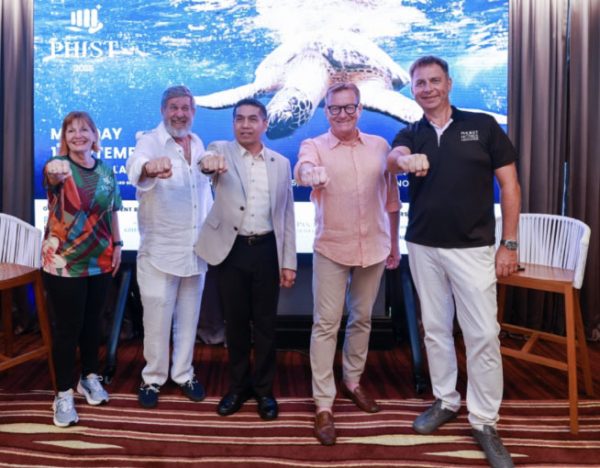PHUKET, 3 September 2025: Asia’s largest sustainability forum for tourism, PHIST 2025, set new records on Monday as more than 1,300 delegates gathered in Phuket, up from 900 last year.
The conference, held at Angsana Laguna Phuket, highlighted the urgent need for the island to strike a balance between rapid growth and sustainability, and called for long-overdue action on infrastructure, housing, and governance.

(Left to Right) Jayne MacDougall, Executive Director, Phuket Hotels Association; William E. Heinecke, Chairman and Founder, Minor International; Sophon Suwannarat, Phuket Governor; Bernhard Bohnenberger, CEO and Co-Founder, Discover Collection; and Bjorn Courage, President, Phuket Hotels Association, at PHIST 2025 in Phuket.
Now in its 8th year, PHIST (Phuket Hotels for Islands Sustaining Tourism) has evolved into a flagship platform where hoteliers, policymakers, community leaders, and innovators come together to tackle the environmental and social issues shaping Asia’s hospitality industry. The 2025 edition featured 25 sessions, a sustainable fashion show, a farm-to-table showcase, and an awards programme recognising best practices in sustainability.
Phuket’s future zone status

Phuket Governor Sophon Suwannarat used his keynote address to stress that Phuket’s tourism future depends on decisive action from both the central and local governments. He reaffirmed calls for Phuket to be granted Special Economic Zone (SEZ) status. This designation would allow the island to act more independently when budgeting, planning, and regulating infrastructure and the environment.
“For too long we have spoken about transport links between the airport and southern Phuket, yet nothing has happened,” the Governor noted. “Without SEZ status, we cannot address these issues quickly or effectively. Our future competitiveness depends on it.”
The Governor also revealed that four new water treatment plants are currently under construction, with five more in the pipeline. However, he cautioned that these projects cannot be completed unless adequate budgets are allocated from Bangkok. “Phuket generates more than 400 billion baht for the national economy each year, yet we are given only 170 million baht for local development,” he said. “This imbalance is unsustainable. If Phuket is to continue to drive the country’s tourism revenues, we must be allowed to harvest the benefits of SEZ designation and control our own resources.”
Housing Development Pressure
Alongside concerns about transport and water, the Phuket administration has announced that up to 60,000 new housing units are expected to be approved in the next few years. This wave of construction risks overwhelming the island’s infrastructure and adding stress to its already fragile environment.
PHIST speakers urged that housing plans be aligned with sustainability goals, warning that unchecked expansion could erode Phuket’s appeal as a tourism destination.
Industry leaders call for action

William E. Heinecke, Chairman and Founder of Minor International, which operates more than 640 hotels in 65 countries, echoed the call for Phuket to secure SEZ ratification. “Phuket needs the ability to plan, fund, and implement its own infrastructure solutions. Without this, tourism and community life will both suffer,” he said.
Heinecke was honoured with the Green Giant Award for his leadership in sustainable hospitality. He also highlighted Minor’s long-term commitments: “Our framework is built on three pillars – People, Nature and Responsible Business. By 2030, we will support 3 million people through workforce development and community engagement.”
C9 Hotelworks Managing Director and a founding organiser of PHIST, Bill Barnett, told delegates that Thailand’s tourism industry is at a tipping point. “Thailand has a chance to reset. Community engagement and positive social outcomes can no longer be left behind. This is the new battleground for our industry.”
A call for collaboration
The conference reminded delegates of past successes, such as Phuket’s Sandbox programme during the Covid pandemic, which pioneered Thailand’s reopening to international visitors. Speakers emphasised that the same spirit of collaboration must now be applied to sustainability and infrastructure.
As sustainability transitions from a buzzword to a business imperative, PHIST 2025 issued a strong call to action: hotels cannot thrive unless their host communities do too.
Organised by the Phuket Hotels Association, C9 Hotelworks and Greenview, PHIST 2025 is supported by leading hospitality brands including Pan Pacific Hotels, Winnow, Luxury Escapes, Tuu, Delivering Asia, QUO, and SaiYok Springs.
To learn more, visit phist.phukethotelsassociation.com.
About the author
Andrew J Wood is a British-born, Bangkok-based travel writer and tourism specialist. A former hotelier, Skål International executive, and long-time resident of Thailand, Andrew is a regular commentator on tourism, hospitality, and sustainability issues across the Asia Pacific.







I loved Phuket in the past, when locals were less stressed, traffic was normal, and there was space on the beach . I spent around 15 EU winters there . I went to see my old friends 3 years ago and was shocked . Buildings everywhere, the once beautiful hillsides scarred by haphazard villas , impossible traffic congestion, and beach chairs practically the whole width of the beach. Beni dorm at its worst. My dear Thai friends are unhappy, and many have moved up north and to Phuket town. I will not go back, and neither will my decades long western friends who have beautiful memories of Phuket as it once was. We now go to quieter destinations.
Reply to Charubun Pananon
⸻
Agree, this is such a critical issue. It’s not only the stress and discomfort traffic congestion causes residents, but also the frustration it creates for visitors.
And it can be solved…‼️ If Phuket is granted special administrative status, like other major tourism centres, the island could finally self-manage what central government has struggled to deliver — particularly in transport and infrastructure.
Top priority must be making access to and from the airport fast and seamless. This has to sit at the very heart of any development blueprint for Phuket’s tourism future. It’s utterly essential.
Andrew J Wood
03 Oct 2025
Consider to control the expansion of Phuket in certain period of in every 5 years by carrying capacity that the local and central government could provide the supply all of infrastructures until Phuket reach its full and perfect capacity and healthy admirable sustainability, please.